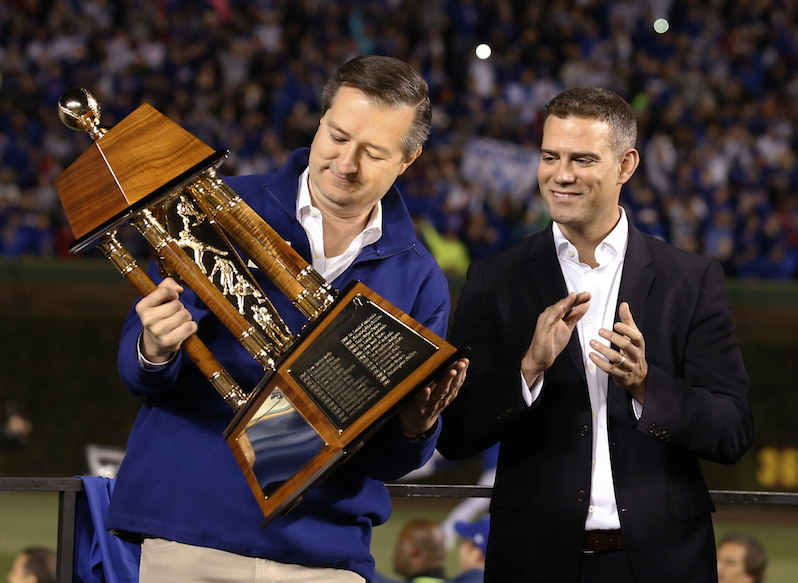Baseball Architect Theo Epstein Continues Tradition of Turning Lovable Losers Into Winners
His first reclamation project was the Boston Red Sox. Now, Epstein, as president of baseball operations for the Chicago Cubs, has made good on his promise to transform the team into a World Series contender.
Theo Epstein, right, celebrates the Cubs’ National League pennant — the team’s first since 1945 — with owner Tom Ricketts. (Nam Y. Huh / AP)
One of the more interesting facts about Theo Nathaniel Epstein, the president of baseball operations for the Chicago Cubs, is that his great-grandfather, Philip, and great-uncle, Julius, won Academy Awards for the screenplay of “Casablanca.” Theo long ago stopped mentioning this to people.
As he once explained to an interviewer:
Every time I heard someone quote from the movie, and that’s what happened at least a couple of times a week, I couldn’t help but say—‘Round up the usual suspects,’ or ‘We’ll always have Paris,’ or ‘Play it, Sam’ or ‘Louis, this could be the start of a beautiful friendship.’ I couldn’t help myself. I’d say ‘You know, my great-grandfather and great-uncle co-wrote that movie.’ Mostly, though, I stopped because I didn’t want that to be the one thing people remembered me for.
That stopped being a problem for Epstein on Halloween night, 2005, when he resigned as general manager of the Boston Red Sox (because “I decided I could no longer put my whole heart and soul into it”) and left Fenway Park wearing a gorilla suit. The explanation he later gave for ducking out like that was that he wanted to avoid reporters. It didn’t work because several witnesses reported that someone in a gorilla suit had driven away from Fenway in Theo Epstein’s Volvo. (The gorilla garb was later auctioned off for $21,000, with proceeds going to charity.)
At the time, that disguise was, arguably, what Epstein, for the first 42 years of his life, was most famous for. That has all changed now.
Epstein ended up going back to the Red Sox, the same team he helped break the Curse of the Bambino in 2004 by winning Boston’s first World Series since 1918. It was an incredible achievement, coming only two years after he became the youngest general manager in baseball at the age of 28. Adding to the wonder was the fact that he had grown up in the Boston area, and the Red Sox were his boyhood team.
For good measure, he helped the Red Sox win a second World Series in 2007. After nine years, he resigned for good. His second decision to leave, as he wrote in an op-ed in the Boston Globe, had “nothing to do with power, pressure, money, or relationships.” The reason he gave for leaving, citing legendary football coach Bill Walsh, was that after 10 years or so, coaches and executives in team sports benefit from a change of scenery.
I don’t think that was why he left. I think he wanted a new challenge, and after helping lift the curse on the team he had grown up with, where else to go but Chicago, where the Cubs hadn’t won a World Series since Henry Ford produced his first Model T in 1908. At the end of the 2011 season, Epstein moved his office to Wrigley Field, bringing old friends Jed Hoyer from the San Diego Padres to be the Cubs’ general manager and Jason McLeod, whom Epstein had worked with in Boston, to be director of scouting.
In the offseason, Epstein had the executive offices modernized and everything daubed in a new coat of Cubs’ royal blue, red and white. But that was just a superficial touch. The real changes he made in the Cubs system altered the entire direction of the franchise. Unlike most of baseball’s longtime losers, the Cubs had significant resources. Not only could they count on healthy attendance year after year from their faithful, but they had a national, or at least semi-national, TV following from a cable system that carried their games through the industrial Midwest, much of the South, and some of the far West.
So Epstein could, if he chose, make deals for the most attractive free agents. But a team built on free agents wasn’t his goal. He beefed up the Cubs’ farm system and insisted his scouts adopt a new-wave attitude, basing their player evaluations not on subjective observations, but on a hitter’s ability to reach base and a pitcher’s ability to prevent a hitter from reaching base. Everyone took a crash course in sabermetrics—a player’s on-base percentage and slugging average replaced batting average and runs batted in as the yardsticks for measuring him, while strikeouts and walks per innings pitched were more important for rating pitchers than wins. Simply put, if a pitcher showed up well in earned run average (ERA), strikeouts and fewest hits allowed, the wins would come.
The Cubs organization, press and the fans were all warned by Epstein that change—the real fundamental change he envisioned—would come slowly. This prediction proved correct. In fact, in his first year, 2012, the Cubs suffered a sharp regression, from 71-91 in 2011 to 61-101 in 2012. Over the next two years, movement was as tortuously slow as in a Beckett play: In 2013, the Cubs won 66 games and, in 2014, just 73.
Cubs fans, though, are patient. They have learned the hard way after over 100 years of suffering.Then it all came together. Last season, the Cubs won 97 games and took the National League Central Division before running into a New York Mets express train headed to the World Series. This year, no team could stop the Cubs on their way to the World Series, not even the Los Angeles Dodgers and one of the best pitchers in baseball, Clayton Kershaw, whom Chicago beat Saturday night to clinch the pennant.
The Cubs closed out the regular season with a .640 win-loss percentage, by far the best in the National League (NL) and all of the majors (the Cubs were the only team over .600). They were third in the big leagues in scoring, behind the Boston Red Sox (who get to use a designated hitter instead of its pitchers) and the Colorado Rockies (who play in baseball’s best hitters’ park). The pitching staff had the game’s lowest ERA (3.15), was third in strikeouts and allowed fewer hits than any other team in MLB.
How did Epstein do it? The team was built through a combination of developing young players through the farm system, shrewd trades and even shrewder free-agent signings.
For instance, Epstein chose Kris Bryant in the first round of the 2013 amateur draft, passing up a college pitching phenom, Jon Gray, who was ranked number one by most experts. But Epstein didn’t like Gray’s fastball. Gray has so far been a mediocre pro, going 10-8 with a 4.42 ERA this year for the Rockies. During the regular season, Bryant was third in the National League in home runs allowed with 39.
First baseman Anthony Rizzo batted just .141 for the San Diego Padres in 2011, the lowest batting average of any non-pitcher or catcher with at least 100 at-bats since 1991. But Epstein and his scouts saw something in Rizzo that others didn’t and traded for him. In 2015, he posted a .387 on-base percentage average, .512 slugging average and 31 home runs. This year, he finished second in the NL with 109 RBIs and hit 32 home runs.
(Watch Rizzo and Epstein do a little AC/DC karaoke with blogger Dan Katz.)
The Cubs also acquired Jake Arrieta, who was a flop with the Baltimore Orioles. Midway through the 2013 season, his ERA with the Orioles was 7.23. When Cubs pitching coach Chris Bosio got hold of him, he stressed that Arrieta should rely more on his harder stuff and quit trying to paint the corners of the strike zone. Arrieta’s ERA for the rest of 2013 with the Cubs was 3.66, half of what he had posted in Baltimore. Over the last two seasons he has been one of the best and most consistent pitchers in the major leagues, posting 18 wins (fourth in the NL) with a 3.10 ERA.
Perhaps Epstein’s shrewdest move was grabbing left-hander Jon Lester, formerly of the Red Sox, in the free-agent market in 2014. One of Epstein’s favorite dictums is to not sign a player who appears to be past his peak. Another of his favorite dictums is not to be an ideologue: Don’t stick to your dictums when there’s good evidence to the contrary. Epstein knew Lester very well from their time in Boston and knew an ace when he saw one. This year, Lester was second in the National League with 19 wins and a 2.44 ERA.
Kyle Hendricks was another find. After batting around the minors for a few years, Hendricks was acquired by the Cubs and made his MLB debut with them in July 2014. This season, he was 16-8 with the best ERA in the National League, 2.13. His biggest win was Saturday night when he finished off the Dodgers in 88 pitches to take the Cubbies to their first World Series since 1945.
Together with Arrieta and Lester, Hendricks gives the Cubs the best one-two-three starting punch in either league.
All this year’s Cubs team needed was a greater closer, and in July, when the fading New York Yankees indicated they would give up Aroldis Chapman for some minor league prospects, Epstein jumped at the chance to acquire baseball’s hardest-throwing pitcher. After coming to Chicago on July 25, Chapman saved 16 games, and his ERA with the Cubs is a microscopic 1.01. Chapman would appear to be the final building block needed for a championship team.
Baseball isn’t like pro football or basketball—you don’t get to play for the championship just because you have the best record. All playoff series are crapshoots, and all a president or general manager can do is give his team the best tools to crap shoot with. That’s what Theo Epstein has done for the Cubs this year.
But even if they finally win it all this year, when some of the euphoria dies down, Cubs fans will worry about whether Epstein will be looking around for another reclamation project. My guess is that he’ll be giving them a line from his great-grandfather and great-uncle’s immortal screenplay: “This is the beginning of a beautiful friendship.”
Independent journalism is under threat and overshadowed by heavily funded mainstream media.
You can help level the playing field. Become a member.
Your tax-deductible contribution keeps us digging beneath the headlines to give you thought-provoking, investigative reporting and analysis that unearths what's really happening- without compromise.
Give today to support our courageous, independent journalists.






You need to be a supporter to comment.
There are currently no responses to this article.
Be the first to respond.